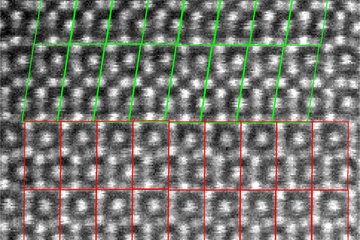All genres
1.
Journal Article
Scale bridging description of coherent phase equilibria in the presence of surfaces and interfaces. Physical Review B 94 (13), 134106 (2016)
2.
Journal Article
Ab initio study of single-crystalline and polycrystalline elastic properties of Mg-substituted calcite crystals. Journal of the Mechanical Behavior of Biomedical Materials 20, pp. 296 - 304 (2013)
3.
Journal Article
Self-consistent scale-bridging approach to compute the elasticity of multi-phase polycrystalline materials. Materials Research Society Symposia Proceedings 1524, pp. 17 - 23 (2013)
4.
Journal Article
Solution enthalpy of hydrogen in fourth row elements: Systematic trends derived from first principles. Physical Review B 85 (15), pp. 155144-1 - 155144-10 (2012)
5.
Conference Paper
Quantum-mechanical study of single-crystalline and polycrystalline elastic properties of Mg-substituted calcite crystals. In: Key Engineering Materials, Vol. 592-593, pp. 335 - 341. 7th International Conference on Materials Structure and Micromechanics of Fracture (MSMF 7), Brno, Czech Republic, July 01, 2013 - July 03, 2013. (2014)
6.
Talk
Innovative concepts in materials design to boost renewable energies. Seminar of Institute for Innovative Technologies, SRH Berlin University of Applied Sciences, Berlin, Germany (2020)
7.
Talk
Ab initio based understanding of the segregation and diffusion mechanisms of hydrogen in steels. SteelyHydrogen 2014, International conference on hydrogen in steels, Ghent, Belgium (2014)
8.
Talk
Ab initio based understanding of the segregation and diffusion mechanisms of hydrogen in steels. Workshop on Hydrogen Embrittlement, Düsseldorf, Germany (2014)
9.
Talk
Self-consistent scale-bridging approach to compute the elasticity of multi-phase polycrystals. DPG Frühjahrstagung, Regensburg, Germany (2013)
10.
Talk
Solution enthalpy of hydrogen in 3d transition metals and neighboring elements. 1st Austrian/German Workshop on Computational Materials Design, Kramsach, Austria (2012)
11.
Talk
Hydrogen solution enthalpies derived from first principles: Chemical trends along the series of transition metals. DPG Frühjahrstagung 2011, Dresden, Germany (2011)
12.
Talk
Strain-Induced Metal-Hydrogen Interactions across the First Transition Series – An Ab Initio Study of Hydrogen Embrittlement. TMS 2011 Meeting, San Diego, CA, USA (2011)
13.
Talk
Chemical trends of the solution enthalpy of hydrogen in 3d transition metals in dilute limit, derived from first principles. DPG Frühjahrstagung 2010, Regensburg, Germany (2010)
14.
Talk
Strain-induced metal-hydrogen interactions across the 1st transition series: An ab initio study of hydrogen embrittlement. DPG Frühjahrstagung 2010, Regensburg, Germany (2010)
15.
Talk
Strain-induced metal-hydrogen interactions across the 1st transition series: An ab initio study of hydrogen embrittlement. APS March Meeting 2010, Portland, OR, USA (2010)
16.
Talk
Chemical trends for the solution enthalpy of hydrogen in 3d transition metals. Computational Materials Science on Complex Energy Landscapes Workshop, Imst, Austria (2010)
17.
Talk
Strain-induced metal-hydrogen interactions across the first transition series - An ab initio study of hydrogen embrittlement. Computational Materials Science on Complex Energy Landscapes Workshop, Imst, Austria (2010)
18.
Talk
Universal trends for the solubility of hydrogen in non-magnetic 3d transition metals derived from first principles. DPG Spring meeting, Dresden, Germany (2009)
19.
Talk
Ab initio study of trends in the thermodynamic and kinetic properties of H in 3d transition metals. Computational Materials Science Workshop, Ebernburg Castle, Germany (2008)
20.
Poster
Combining ab initio with data mining techniques: Solution enthalpy of hydrogen in transition metals. ADIS Conference 2012, Ringberg, Germany (2012)











